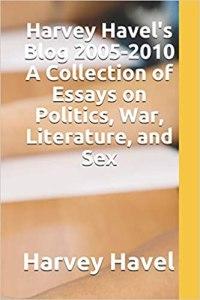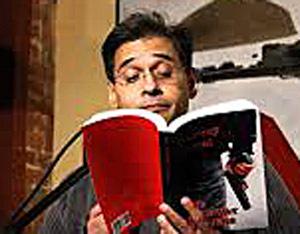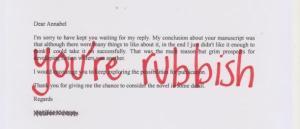 This big fat book showed up unexpected in my mailbox. Harvey Havel is a fixture in the local literary scene. Chatting with him at a recent author talk, it had emerged that we’d both published blog essay collections. So he sent me his. He’s a sweet person. Also tormented.
This big fat book showed up unexpected in my mailbox. Harvey Havel is a fixture in the local literary scene. Chatting with him at a recent author talk, it had emerged that we’d both published blog essay collections. So he sent me his. He’s a sweet person. Also tormented.
The book starts with political essays (a decade and more old). Perhaps unusual for a professional writer of color, his viewpoint is determinedly centrist. And Olympian, looking past the issues of the day, in a larger perspective, trying to see the tectonic forces shaping our politics. As a professional writer, Havel has a glib command of the relevant lingo. Yet I found his analyses somewhat oversimplified, falling short of profundity. (Sorry, Harvey.)

Like about his alcoholism. It nearly destroyed him; he believes it’s actually necessary to sink that low before one can overcome. He’s apparently been off the stuff for a good long time now, but alcoholism still looms as a big presence in his life.
He was also ruined, he says, by money. Given a big lump sum by his father upon college graduation, he lived the high life, as though it would never run out. Of course it did, while turning him into “a man of low morals and character,” blocking his capacity to grow. Thus he says he remained a child (as of 2005 anyway). He had to learn the meaningfulness of earning what one has. He feels his “relationship with money now is the happiness and satisfaction that I have somehow rid myself of it.”
Here, and elsewhere, he brings in belief in God, crediting that for positive change in his life. I know many people feel the same. But Havel never really analyzes this (as he analyzes so much else). I have no such belief. For me, divorcement from reality cannot be the basis for an authentically meaningful life.
One 2009 piece starts off, “read this poem and then we’ll have a discussion about it.” Titled “Qualm” it ostensibly debates pushing an airplane alarm button, and Havel does discuss it at length. Finding this in the book was a nice surprise, as the poet is Therese L. Broderick (my wife).
Havel is not one of those many people who write as a sideline or hobby. Instead, he decided out of college to make this his career. Now approaching 50, he’s been at it for decades. With little reward. He has self-published many books (including this one), but his indefatigable efforts with established presses have met with constant rejection. Publishers tend to be very picky; selling printed books that make money is extremely hard; so a stream of rejection letters is inevitably part of any writer’s life.

I am no stranger to literary rejection myself. I spent years struggling to get my magnum opus (The Case for Rational Optimism) published. UntiI finally remembering the press that, over 30 years prior, had reissued my Albany political book. I’ve had ten book publications and made money on all but one. But the loss on that one exceeded all the gains. So I guess I’m no literary success either.

He has a “thing” for white women. Who, he says, generally refuse to view him romantically because of his color. For me it was height (or its lack). One guy’s recent radio essay related how he’d meet women for dates and see their “libido drain away” when he’d stand up, revealing his shortness. I was clueless in my own younger days (part of my problem), but in hindsight being 5’4″ explains a lot.
Back to Havel and his attraction to white women. One entry in the book is actually titled “In Defense of White People.” I was expecting something sardonic. But no. Havel explains that at one time he did share the stew of negative feelings toward whites that some non-whites hold. However, he says, he joined a white family for a time — what he means by this wasn’t clear to me — but anyway, he received acceptance and love, leading him to reject, as simply incorrect, the standard indictment of whiteness.

Perhaps this partly explains his attraction to white women. Then again, a majority of American women are white, so Havel may actually be conflating an attraction to women with one for white women. But he does feel his color is a barrier with white women in particular.
I found this odd. No doubt some racist women would manifest this, but in my observation, many if not most females are sexually receptive to nonwhites, many indeed positively attracted to them. Secondly, while Havel is slightly brownish, his ethnicity is far from evident visually. In fact, being of Indian ancestry, he is caucasian. Also, while I’m no great judge of this, I would rate him pretty good looking.
So what, really, was the trouble? Relating an actual romantic debacle might have helped elucidate this, but Havel includes none. The book makes it sound as though he never actually had a relationship (despite a lot of sex). However, there are some clues in the book regarding his mindset about women. It smacks of that old stereotype, “objectifying” women. He wants one not just white, but beautiful, well-educated, and affluent; it’s very much a package.

How about just relating to a woman as a fellow human being?
